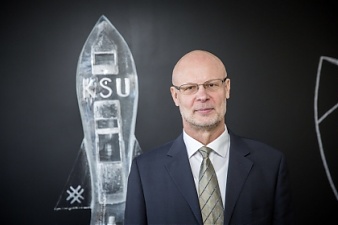Analytics, Direct Speech, Economics, Education and Science, EU – Baltic States, Lithuania
International Internet Magazine. Baltic States news & analytics
Tuesday, 23.04.2024, 23:02
Lithuania on the road to a shifting economic identity
 Print version
Print version |
|---|
This can be said both of Lithuania
and, to some limited extent, of many Central and Eastern European countries.
Nonetheless, right now there are many indicators and the shifting political
rhetoric pointing to the fact that Lithuania’s social and economic life is
undergoing deep processes critical to further development of the state, their
understanding forming the foundation on which Lithuania’s future choice will
depend. These tectonic fractures in the social shift are still not being
understood, structured, or strategized upon sufficiently. But they occur very
visibly and strongly through everyday political, economic, ethical, or cultural
decisions that are sometimes unexpected, quite often absurd, but always
definitely standing to express the deep-seated fundamentalism of our problems,
and their significance for the continued evolution of the state. This can be
understood as a breaking point when the legacy of the post-soviet society has
run out of steam and is going though an agony, but a new identity is only
taking shape and is offering many controversial future alternatives and
possible scenarios of development.
Contrary to Estonia, which has never strategically departed from its focused aspirations to attain a Scandinavian identity, Lithuania’s social and economic processes have never been sufficiently balanced or cohesive on a strategic or value level. They have basically been kept focussed and in line by EU and NATO landmarks. Periods of excellent economic growth (with the exception of crisis years) brought up their own share of particular problems of continued retardation, half-baked decisions, and unused opportunities in different areas. We might say that the transition period has gone on for too long and only now people are starting to grasp some of the irreversible consequences and to feel a need for some real changes. The strongest push towards radical transformation with many direct and contingent consequences comes from the scale of migration in the European Union, which affects, both directly and not, all areas of life, and not necessarily in a negative way. Be it for the country’s predominantly catholic tradition or the fact that it has always been a bridge between the western-minded Europe and the space of the eastern Byzantine identity throughout the course of history, Lithuania’s drive for socioeconomic transformation is affected by ideological and value-based stimuli just as strongly as it is by rational arguments and development policies that are grounded on evidence and open to the ideals of the globalised world. This leads to a certain degree of controversy in the economic policy, the way it happened with the implementation of the euro (01/01/2015) as more political than economic project. The country had not done its homework properly – the social system, education, healthcare, and public governance were yet to be reformed – leading to a slowdown the rhythm of Lithuania’s economy, compared to many economic leaders in the Eurozone.
As a result, the country is
experiencing a phase of unchecked growth of prices (and salaries, to an
extent), with the inflation rate officially standing at 5% (as of November
2017); one might even suspect that processes of turning ‘Greek’ are at play,
despite the positive and rather impressive GDP gain. On the other hand,
however, even in the absence of a solid economic foundation, the euro
introduction fully opened up floodgates of European social and economic
integration, driving inevitable change in the fields that had been riddled by
elements of post-soviet thinking. Such fractures in identity usually happen in
rather radical forms and through new ideological campaigns reflecting the
realpolitik. It is like a compensatory mechanism that has been targeting
structurally unreformed, post-soviet heritage-ridden fields for decades. The
first reform of this type took place in the process of restructuring the social
model, which produced a modernised labour code. Currently, matters of
reformation of the systems of education and higher learning are becoming
priority number one, with people realising the role the learning society and
innovation economy plays in boosting the global competitiveness of the country.
The country’s ability to create an effective education system will largely
determine the course Lithuania will take in the foreseeable future. This goes
hand in hand with the budding vision of Lithuania as an innovative and
technological country, its principal resource educated people, architects of
new technologies. Ideologically, this translates into campaigns on mass
education of IT and biotech specialists, shunning aside the classical social
sciences and liberal arts.
Comparable expressions of the formation
of the new and increasingly European economic identity extend to virtually all
of the main spheres of life, from reduction of social isolation, integration of
children at risk and orphans into families, radicalisation and politicisation
of the anti-alcohol movement, to increasing the involvement of the church and
the ‘tough’ pro-Atlantic foreign policy grounded on the promotion of growing
patriotism. Without the shadow of a doubt, all of that also constitutes a move
towards moral rebirth, its actual implications still rather vague. Yet one
thing is certain: the post-soviet identity is being pushed away and is losing
its significance and effect on the development of today’s society. Lithuania is
at a crossroads and the path it chooses will determine whether actual processes
of reforms and modernisation will begin and shrinking regions will be reborn as
the country joins the Baltic, Nordic, and Polish strategic vectors in the new
‘post-postsoviet’ perspective of historical development.








 «The Baltic Course» Is Sold and Stays in Business!
«The Baltic Course» Is Sold and Stays in Business!

